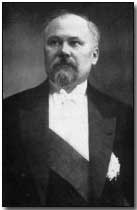Who's Who - Raymond Poincare
 Raymond Poincare
(1860-1934) was born on 20 August 1860 at Bar-le-duc in Lorraine, the son of
an engineer.
Raymond Poincare
(1860-1934) was born on 20 August 1860 at Bar-le-duc in Lorraine, the son of
an engineer.
Poincare studied at the University of Paris, after which he became a lawyer.
Elected to the Chamber of Deputies in 1887, Poincare held various cabinet posts between 1893 and 1906, including the ministries of education and finance, entering the senate in 1903. At 33 he was the youngest person to hold a ministry in the history of the republic.
Poincare became premier and foreign minister in January 1912 of a coalition government and succeeded Armand Fallieres as president in January 1913, defeating Georges Clemenceau.
A conservative and a nationalist, as president Poincare moved to strengthen France's armed forces for the eventuality of war. A bill increasing the duration of national service to three years was passed, and alliances with Britain and Russia strengthened.
During the First World War Poincare called upon Georges Clemenceau to form a government in 1917, despite his personal loathing of the man.
Following the armistice Poincare called for harsh remedies against Germany, and for future guarantees of French security. Partly frustrated in this, he consequently regarded the Versailles treaty as too lax in its treatment of Germany.
Upon completion of his presidential term in January 1920 Poincare returned to the senate, becoming leader of the coalition of conservative parties, the 'bloc national'. This in turn brought him to the premiership in January 1922.
As premier Poincare followed up his harsh rhetoric against Germany, sending troops to occupy the Ruhr in January 1923 to signify his anger at Germany's failure to pay the heavy reparations imposed at Versailles. Nevertheless he failed to coerce Germany into making payments.
At the election of May 1924 the conservatives suffered defeat, causing Poincare to resign; he was replaced as prime minister by Edouard Herriot. He returned to the premiership in July 1926 in the midst of a financial crisis. He dealt with this by initiating an extreme deflationary policy, balancing the budget and stabilising the Franc at one fifth of its former value, in 1928.
Poincare retired from office in July 1929 citing ill-health.
Raymond Poincare died on 15 October 1934 in Paris.
Click here to read the text of Poincare's opening of the Paris Peace Conference in January 1919.
Click here to view film footage of Poincare with King George V during the latter's state visit to France in 1914. Click here to view footage of Poincare during the opening of his July 1914 state visit to Russia.
A 'Toasting Fork' was a bayonet, often used for the named purpose.
- Did you know?
